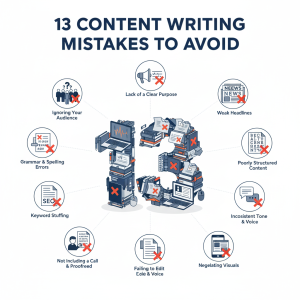13 Content Writing Mistakes to Avoid

Great content can attract readers and grow your audience. But common writing mistakes can scare them away.
You don’t have to be a professional writer to create good content. You just need to know what to avoid.
Here are 13 simple content writing mistakes that can hurt your results and how to fix them.
-
Writing Without Knowing Your Audience
Creating content without understanding your audience leads to irrelevant and unhelpful writing. Always research who you’re writing for their needs, pain points, and preferences.
-
Ignoring SEO Basics
Even great content gets buried if it’s not optimized. Neglecting keywords, headings, and meta descriptions can keep your work invisible online.
-
Ignoring the Power of the Headline
A headline is the first thing readers see. If it’s dull or unclear, they won’t click. Headlines should be clear, compelling, and promise value.
-
Keyword Stuffing
Overloading articles with keywords makes content sound robotic. Write for humans first, and naturally weave in keywords.
-
Lacking Structure
Walls of text overwhelm readers. Use headings, subheadings, bullet points, and short paragraphs to make your writing easy to skim.
-
Writing Too Much Fluff
Adding unnecessary words or repeating ideas just to make content longer annoys readers. Be concise and deliver value.
-
Forgetting the Call-to-Action (CTA)
If your content doesn’t tell readers what to do next subscribe, buy, share they may just leave. Always guide them with a clear CTA.
-
Poor Grammar and Spelling
Mistakes hurt credibility. Even one sloppy error can make readers question your professionalism. Always proofread before publishing.
-
Ignoring Formatting
Unreadable fonts, tiny text, or lack of white space can drive readers away. Presentation matters as much as words.
-
Writing Without Research
Shallow content without reliable sources looks untrustworthy. Back up your claims with facts, examples, and expert references.
-
Overcomplicating Language
Big words don’t make you sound smarter they make content harder to read. Use simple, clear language for wider reach.
-
Not Updating Old Content
Outdated stats, broken links, and old trends weaken credibility. Refresh older content to keep it relevant and ranking.
-
Writing for Yourself, Not the Reader
Focusing on what you want to say instead of what your audience wants to know results in disengagement. Always put readers first.




